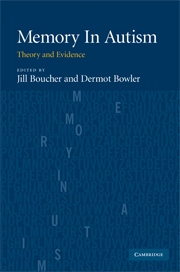Book contents
- Frontmatter
- Contents
- List of tables
- List of figures
- List of contributors
- Foreword
- Preface
- Part I Introduction
- Part II The neurobiology of memory in autism
- Part III The psychology of memory in autism
- 7 Memory within a complex information processing model of autism
- 8 Episodic memory, semantic memory and self-awareness in high-functioning autism
- 9 Episodic memory and autonoetic consciousness in autistic spectrum disorders: the roles of self-awareness, representational abilities and temporal cognition
- 10 Impairments in social memory in autism? Evidence from behaviour and neuroimaging
- 11 Memory characteristics in individuals with savant skills
- 12 Working memory and immediate memory in autism spectrum disorders
- 13 Rehearsal and directed forgetting in adults with Asperger syndrome
- 14 Memory, language and intellectual ability in low-functioning autism
- Part IV Overview
- Index
7 - Memory within a complex information processing model of autism
Published online by Cambridge University Press: 05 November 2009
- Frontmatter
- Contents
- List of tables
- List of figures
- List of contributors
- Foreword
- Preface
- Part I Introduction
- Part II The neurobiology of memory in autism
- Part III The psychology of memory in autism
- 7 Memory within a complex information processing model of autism
- 8 Episodic memory, semantic memory and self-awareness in high-functioning autism
- 9 Episodic memory and autonoetic consciousness in autistic spectrum disorders: the roles of self-awareness, representational abilities and temporal cognition
- 10 Impairments in social memory in autism? Evidence from behaviour and neuroimaging
- 11 Memory characteristics in individuals with savant skills
- 12 Working memory and immediate memory in autism spectrum disorders
- 13 Rehearsal and directed forgetting in adults with Asperger syndrome
- 14 Memory, language and intellectual ability in low-functioning autism
- Part IV Overview
- Index
Summary
Introduction
Clinical neuropsychologists have often commented that sometimes a memory problem is not a problem with memory. The implication of this remark is that what appears to be a difficulty with remembering is actually the result of a deficit in some other domain of cognitive functioning, influencing memory only indirectly. Our studies of the profile of neuropsychological functioning in autism have provided evidence of multiple primary coexisting deficits with one of the affected cognitive processes being memory (Minshew, Goldstein & Siegel, 1997; Williams, Goldstein & Minshew, 2006a). Over the past fifteen years, we have performed comprehensive studies of memory functioning in over 100 children, adolescents and adults, all of whom met Autism Diagnostic Interview (ADI & ADI-Revised, Le Couteur et al., 1989; Lord, Rutter & Le Couteur, 1994), Autism Diagnostic Observation Schedule (ADOS; Lord et al., 1989, 1999), and expert opinion criteria for autistic disorder (AD), including onset prior to age 3 years. The lower limit of Full-Scale and Verbal IQ scores varied between 70 and 80 depending on the study. The results of this research have led us to conclude that the memory impairment is universal across participants with high-functioning autism (HFA), but is selective in that it does not involve all aspects of memory functioning. The memory processes in HFA are differentially affected by domain, demands of the memory task, and the cognitive abilities of the individual.
- Type
- Chapter
- Information
- Memory In AutismTheory and Evidence, pp. 125 - 142Publisher: Cambridge University PressPrint publication year: 2008
- 5
- Cited by



